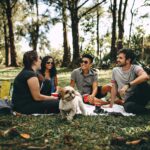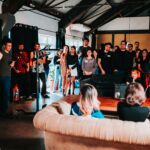I can’t say I’m a big AFL fan. However, I am a fan of AFL player and 2014 Australian of the Year Adam Goodes. And I have been concerned by what I have seen in the past few weeks.
If you haven’t followed it, a rough outline of what happened is fans booed Goodes to such an extent of late that he is contemplating retirement.
This occurred for a few reasons depending on what story you believe: either after Goodes called out a teenage girl for calling him an ape last year; and/or because he performed a celebratory dance a few games ago which culminated with Goodes throwing an imaginary spear. The alternative version is that he is booed because opposing fans don’t like him as a player.
For whatever reason you support, Goodes himself has outlined that he is finding the booing difficult and deeply wounding and is even contemplating retirement. He even voluntarily sat out a match.
An argument has raged on about whether this booing does or does not constitute racism. Much of this argument to me misses the point entirely. If the target of such an action believes it be offensive, and even racist and has request it to be stopped, then stop it.
Period.
Why are we even arguing?
What is clear though is that little of the commentary has even begun to try and understand the view from the world of Adam Goodes. There is one notable exception, news anchor and journalist Stan Grant here.
Grant does a wonderful job in outlining what living in Australia means from an Indigenous man’s point of view, and why it matters. It’s well worth a read.
One thing that working in community engagement has taught me is that it really doesn’t cost you a thing to better understand somebody else’s point of view or somebody else’s values.
In fact, it often greatly enhances your ability to make informed decisions. It has broadened my view of many debates.
The only way in which public debate can be truly meaningful is to listen to and understand the needs, concerns and values of others.
Unfortunately the Adam Goodes episode demonstrated that as a society, when it comes to taking the time to better understand challenges faced by our Indigenous community, we have a very long way to go.
Rather than everybody from Shane Warne to Andrew Bolt offering an opinion, maybe we should have collectively closed our mouths and opened our ears.





